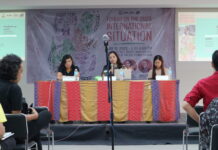
On August 22, Dr. Cosmas Musumali — a German-educated economist, general secretary of the Socialist Party of Zambia (SP) and a progressive intellectual and activist well-known in Africa and the Global South — was arrested in the country’s Copperbelt province.
Musumali was holding a meeting with 29 SP members who were then arrested with him. The Zambian police brought them to a detention facility in the morning and released them in the afternoon.
The SP official and members were charged with “conduct likely to cause the breach of peace,” an offense contained in the country’s Public Order Act. The law was imposed by British colonial authorities in order to make and legalize arbitrary arrests of freedom fighters.
The SP, led by its presidential candidate Dr. Fred M’membe — a journalist who is well-known in the country — is one of the political parties contesting Zambia’s August 2021 national elections.
Opposition parties are running against the ruling Patriotic Front (PF), led by Edgar Chagwa Lungu, the country’s incumbent president. Lungu and the PF are seeking to amend the Constitution through the controversial Bill 10 so he can run for a third term.
Amidst the Covid-19 pandemic, Lungu and the PF have been going around the country distributing government dole-outs. Videos of these thinly-veiled campaign sorties have been circulating in Zambian social media, shocking people with the flouting of social distancing.
Musumali and comrades’ arrest is only the latest instance of the worsening political repression in Zambia — a situation that runs counter to its constitution’s proud declaration of upholding “freedom of conscience, expression, assembly, movement and association.”
Political repression
On April 9, the government’s Independent Broadcasting Authority cancelled the license of Prime TV, the most popular television station in Zambia, especially in Lusaka, for refusing to air for free government advertisements informing the public about Covid-19.
Prime TV is known for political discussions on topics such as government performance, the country’s many opposition parties, Bill 10 and Lungu’s eligibility to run for another term. It has also broadcasted opposition parties’ rallies, which are not shown in government TV stations.
In early June, youth activists in the country called for a protest on June 22 to denounce what they perceive as corruption in government, lack of freedom of speech, and police brutality. The call was met with a warm response in social media, especially by the youth.
Protest actions in Zambia and especially in Lusaka, however, are always dispersed by truncheon-wielding policemen. The youths’ call for protest was condemned by PF government officials, with one publicly calling on the police to “break the bones” of the protestors.
The activists, in response, backed out of the call to march to the country’s National Assembly building. They pushed through with the protest, however, but only a handful showed up, and in a bush located in the outskirts of Lusaka. The PF government clearly had its way.
The Lungu regime has also given rise to its version of what political commentators call “cadre-ism,” a catch-all phrase for the local warlord-type activities of party officials known as cadres. PF cadres lord over many businesses and communities across the country.
People know PF cadres for beating up oppositionists in communities, raiding radio stations that guest opposition politicians, and even disrupting a national public gathering to discuss Bill 10. PF cadres are also notorious for raiding and harassing police officers in police stations.
Analysts point to many other instances of political repression in the country. Opposition parties are denied permits to hold rallies. A law restricting NGO activities is being enforced. There is growing self-censorship in the media. Social media posts are being threatened with libel.
Growing condemnation
Political repression in the country is now being met with growing condemnation by various sectors of society. Leading the pack in the self-proclaimed Christian nation are leaders of the Church, although political parties and analysts are not far behind.
Political analyst Sishuwa Sishuwa bemoans what he calls “lawfare,” the “strategic use of the law and legal institutions by actors in the executive to achieve political goals, obscure their authoritarian tendencies and enhance their grip on power.”
Emeritus archbishop Telesphore Mpundu of Lusaka claimed “This is not a democracy at all! This is a dictatorship in everything, except in name. That is it! There are no two ways about it. People should not be going around beating about the bush; this is the situation.”
Gilbert Temba, management committee chair of Our Civic Duty Association or OCIDA, an alliance of eminent Zambians, said, “The party in government, who should be the first to lead by example and denounce and curtail political violence, is at the forefront of instigating acts of violence.”
Expressing fears felt by many, Temba warned that “Much more worrying, this is happening so close to next year’s general elections; virtually signaling a bloody… election.” This matches with Mpundu’s warning about “widespread bloodshed” if government intolerance goes unchecked.
Condemning the arrest of Musumali and his comrades, SP’s M’membe stated that the PF is “making an enormous mistake… Impunity is a hyena that has no ally or friend. The system that they thrive on to subvert multiparty democracy… will come for their necks tomorrow.”
Mpundu said, “It is time for us to take a stand and resolve to speak out to challenge the undemocratic tendencies and violations of human rights… It is of utmost importance that we… assert the power of collective action, and speak for the weak and marginalised in our society.” #


















